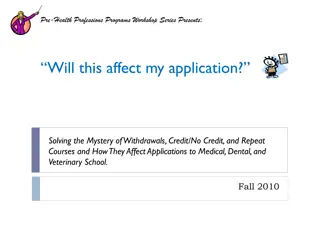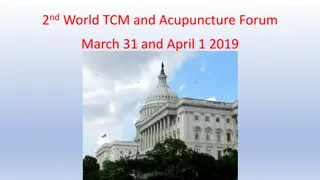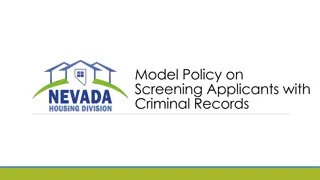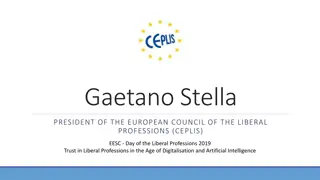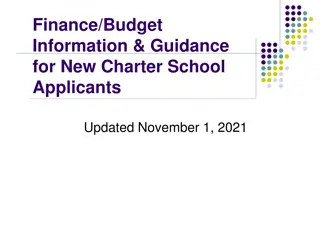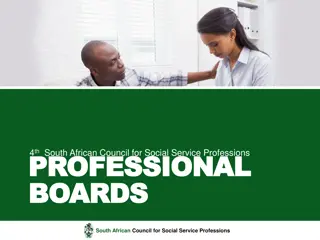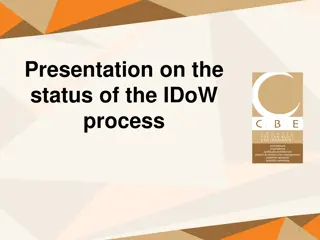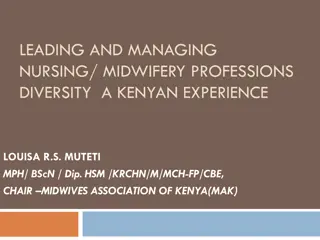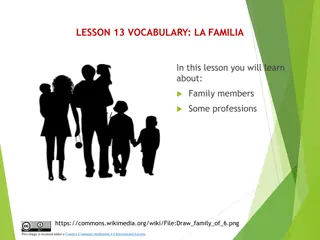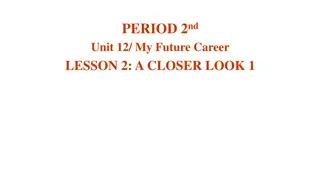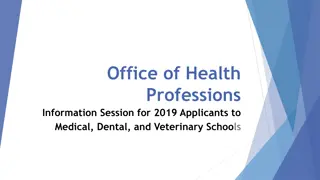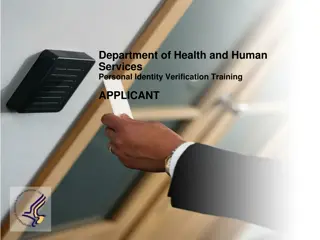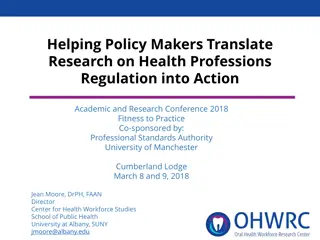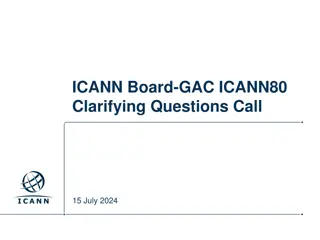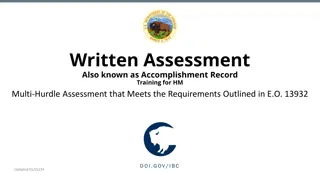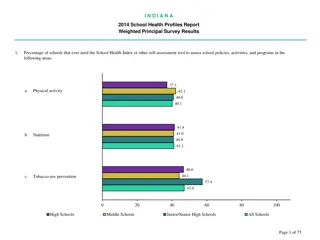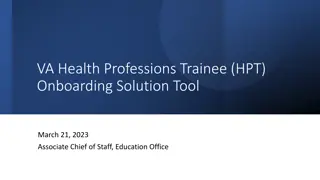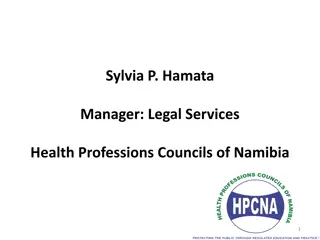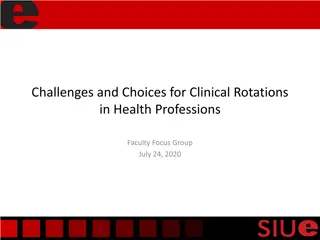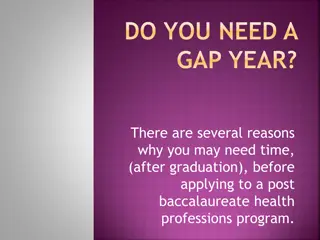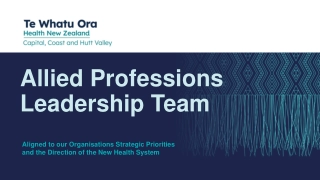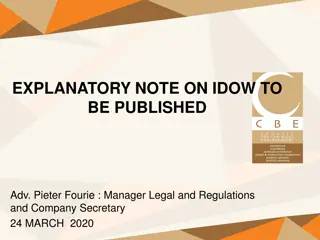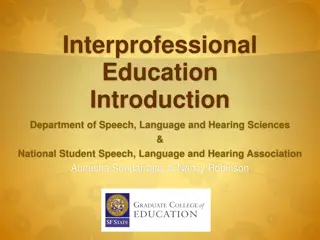Insights for Health Professions School Applicants
Explore the essential information and competencies needed by applicants to medical, dental, and veterinary schools. Learn about the key concepts, characteristics of a good applicant, holistic review process, and considerations before applying to professional school. Discover what makes a successful applicant based on ethical responsibility, interpersonal skills, critical thinking, and more. Understand how to align your values with the missions of renowned medical institutions like Columbia University and the University of Chicago. Gain valuable insights for a successful application journey.
Download Presentation

Please find below an Image/Link to download the presentation.
The content on the website is provided AS IS for your information and personal use only. It may not be sold, licensed, or shared on other websites without obtaining consent from the author. Download presentation by click this link. If you encounter any issues during the download, it is possible that the publisher has removed the file from their server.
E N D
Presentation Transcript
Office of Health Professions Information Session for 2018 Applicants to Medical, Dental, and Veterinary Schools
Objectives Introduce key concepts that are foundational to admissions Mission Competencies Holistic Review Cost of a health professions education Applicant characteristics Process for 2018 applicants Timing of your application and Success!
What makes a good applicant? Intrapersonal Competencies: Ethical responsibility to self and others; reliability & dependability; resilience and adaptability, capacity for improvement Interpersonal Competencies: Service orientation; social skills; cultural competence; teamwork; oral communication Thinking and Reasoning Competencies: Critical Thinking; quantitative reasoning; scientific inquiry; written communication Science Competencies: Living systems; human behavior
Professional Schools SelectionHolistic Review Holistic review is a flexible, individualized way of assessing an applicant s capabilities by which balanced consideration is given to experiences, attributes, and academic metrics and, when considered in combination, how the individual might contribute value as a medical student and physician. (AAMC) Distance traveled a key concept.
Considerations before Applying Admissions decisions are based on the mission of the school. The mission of Columbia University College of Physicians and Surgeons is to prepare graduates to be leaders and role models who define excellence in patient care, medical research, education, and health care policy. Their experiences at P&S will enable them to shape the future and set the standards of medicine in the United States and the world. Their guided exposure and training will allow them to exhibit the highest principles of humanism and professionalism in their responsibilities to their patients, to their community, and to society. The mission of the University of Massachusetts Medical School is to advance the health and well-being of the people of the commonwealth and the world through pioneering advances in education, research and health care delivery. At the University of Chicago, in an atmosphere of interdisciplinary scholarship and discovery, the Pritzker School of Medicine is dedicated to inspiring diverse students of exceptional promise to become leaders and innovators in science and medicine for the betterment of humanity. Considerations: Scholarship, Leadership, Exceptionalism, Innovation, Community What do you value?
How much does the medical degree cost? Cost, M1 In-state, 2016-17 Median Tuition & Fees Median Cost of Attendance - COA Median 4-Yr COA for Class of 2017 Public Private $57,472 (+4%) $80,753 (+3%) $314,203 (+3%) $36,453 (+4%) $59,026 (+2%) $240,351 (+3%) Source: 2016 AAMC debt, costs and loan repayment card. Research Financial Aid for every schol: Budget https://pritzker.uchicago.edu/page/student-budget Cost from year to year varies based on amount of time spent in the curriculum. Financial aid policies are difficult to parse.
Costs of Other Health Professions Osteopathic School COA Yr 1 UNECOM Touro $72,655 $92,852 School Penn U Conn (Res.) UCSF COA Yr 1 $113,876 $66,317 $84,640 Total COA $451,412 $268,047 $350,067 Dental Veterinary: Debt-to-income ration is 2:1 http://www.aavmc.org/students-applicants-and-advisors/funding- education.aspx for the Cost Comparison Tool
Key Areas of Assessment for Admissions Cumulative GPA/Science GPA Admissions Tests* Health-related experiences Community Service/ADVOCACY Research experiences Recommendation letters (and committee letter) HP Interview Performance (MMI, panel, one-on-one) * MCAT, DAT, GRE for Medical, Dental, Veterinary Schools
Professionalism and Character Professionalism and integrity are essential components of the selection process. Exhibit high personal standards. Williams Code of Conduct and Honor System--know and follow. Cheating, plagiarism, alcohol/drug violations, vandalism, all compromise your character AND your application. You must disclose disciplinary actions, misdemeanors, and felony convictions on both the AMCAS and some secondary applications. In general, TIME and EVIDENCE of humility, reparation, and/or lessons learned are necessary before applying.
Health Professions Process 2018 The process of preparation by student, HP advisor, faculty evaluators, employers, mentors, supervisors requires enormous investment of dedicated time, focus, and energy. Robust process with a timeline for all required elements of a successful application. http://careers.williams.edu/professional-schools/application-timeline/ Objective is to evaluate readiness and promise of health professions candidates from Williams College in a narrative (committee letter). Extracurricular activities Experiences in a relevant medical field Student s personal story Academic record Letters of recommendation
Whats New in the HP Process for 2018 Three required elements Pre-Health Self-Assessment Guide* Resume Biographical Report You will upload these documents to your veCollect account according to stated deadlines veCollect is the virtual storage bin that you create for these documents and letters of evaluation. Directions for creating letter records for these documents are linked on the application timeline. *Note: The Guide is meant to provide the opportunity for self-reflection and honest assessment of your candidacy. It will not be used by the HP committee.
Whats New in the HP Process for 2018 Intent to Apply Form Google doc that you complete and submit before January 15 Important to have a firm count of participants in the application cycle Submission of the form triggers manual authorization of your veCollect account (paid for by Williams)
Health Professions Committee Candidate File Resume Biographical Report (Word doc) Activities during academic year, spring break trips, winter term, summers Experiences before college should be included only if relevant or significant (e.g., 7 years of volunteering at your local hospital) Personal statement incorporated in the Bio Report Excellent practice for primary applications Prompts are included. This is your narrative and should provide a rationale on why this professional path; focus on something that is distinctive or less prominent in the rest of your application Transcripts HP Office can download your Williams transcript You must send transcripts of coursework completed elsewhere to LINDA MORAN--either paper or preferably in electronic form Letters of recommendation
Health Professions Committee Process Standardized test scores not included in the file, so no worries if you have not taken the test. TWO of four required letters should be in your file by April 1, 2017. Committee review takes place in early May. You will be rated according to the following: Academic Rigor/Strength of Schedule Leadership Community Service Extracurriculars Clinical experience Research Experiences (clinical, lab-based, public health or community-based) Letters of Recommendation Maturity/Readiness
Health Professions Committee Process contd Committee is Director and five others (faculty and community) Task is to assess each Candidate s file Initiate first drafts of committee letter Committee arrives at final confidentialrating for each candidate: Good Very good Excellent Outstanding Health Professions Office Writes the official committee letter Sends the veCollect letter quiver to AMCAS
The question: When to apply? As a Junior? Matriculate right after Williams graduation. Challenge to complete requirements and to enjoy senior year As a Senior? Have one year to broaden experiences, gain maturity and insight into yourself and medicine/dentistry/veterinary profession. This time useful for strengthening clinical or research capabilities, to participate in relevant activities (teaching, consulting), and engage in clinical internships, fellowship programs and perhaps an educational program (MPH, MA) As an alum? The trend is toward applying after 1-2 gap years, and success is more predictable. Your committee ranking stays with you, so make sure you enter this application process at your competitive best! We do not generate a new letter for re-applicants.
What are some signs that the time is not right to apply? Your MCAT/DAT/GRE scores are not competitive (need to re-take) Use MSAR, VMSAR, and ADEA sites to research your competitiveness. Your cumulative GPA and/or Science GPA (BCPM) are not competitive. Your are not sure if your letter references will be strong. You do not know how to answer, Why do you want to be a dentist/physician/veterinarian? If I say tell me your story, and you are stumped, time to re-think! You are working on a thesis during senior year, and do not have the time to complete application requirements, submit secondaries, and possibly interview without compromising academic performance in senior year. You have limited experience of what goes into the life of a HC professional, and/or limited experience with patients in any context. You may want to take a year or more to pursue other experiences or accomplish other goals before going to medicine. Average age of matriculation nationally is 24 years old.
AAMC Data on 2017 Williams Applicants Mean GPA Mean GPA N=66* CUM BCPM CUM AO CUM UG GPA Applied Williams 3.53 3.59 3.56 Accepted* Williams 3.64 3.66 3.65 National 3.46 3.7 3.56 National 3.71 3.83 3.76 Mean MCAT Section CPBS CARS BBLS PSBF Behav Total Applied Williams 128.8 128.1 128.8 128.8 Accepted Williams 129.9 128.1 129.2 129.2 National 126.2 125.7 126.6 126.6 National 128.2 127.4 128.5 128.5 514.3 504.9 516.4 512.5
When to Apply You should apply to medical school/dental school/veterinary school when all aspects of your application are strong, competitive, and you have a chance to be interviewed. This means your MCAT/DAT/GRE and GPA are competitive, You have assurance of quality of your references, You have a meaningful accumulation of medically-related experiences and volunteer work that speaks to your commitment to making a difference in the lives of others. If you have shortcomings in one aspect (Metrics), and you have a great story (e.g. DISTANCE TRAVELED) or a well-defined record of ADVOCACY, you need to speak with me. The Self-Assessment Guide should assist with this decision.
If You Plan to Apply for 2018 Matriculation Submit the Intent to Apply Form Get your house in order Think carefully about evaluators and ask them in a timely, polite manner Maintain your academic/work obligations, gain practical (hands-on) experience If possible, gain research experience with results and a product (thesis, poster, article) Hone your interpersonal skills: teamwork, cultural competence, leadership skills READ and BE INFORMED about health care and other topics (emergent diseases, end-of-life care, population medicine, substance abuse, social justice ). Literature of medicine is particularly rich: Humanities and Medicine programs at many medical schools. PLAN TO APPLY EARLY. All applications open around June 1. Have 2-3 BACK-UP PLANS. There are no guarantees.
Our Ongoing Commitment Communication is vital to the process. Office of Health Professions will provide the structure but you must have initiative. How best to communicate with alumni? Monthly e-newsletter Listserv message Application Timeline is the guide for the process. http://careers.williams.edu/professional-schools/application-timeline/ Adhere to the deadlines. Your maturity and readiness for this process and for a professional career are demonstrated by your behaviors and attitude. More information will be added to this timeline as the year progresses.
Deadlines for 2018 Applicants January 15, 2017 January 31, 2017 February 1, 2017 February 15, 2017 March-April April 1, 2017 June 1, 2017 Intent to Apply Form Start on Evaluator Records; Request Outside Transcripts Pre-Health Self-Assessment Guide and Resume Biographical Report (Personal Statement included) Interview Scheduling with Director Two letters of recommendation must be in veCollect Your candidate file must be complete Three documents by you; 4-6 letters of rec by evaluators; outside transcripts
Finale Questions?


